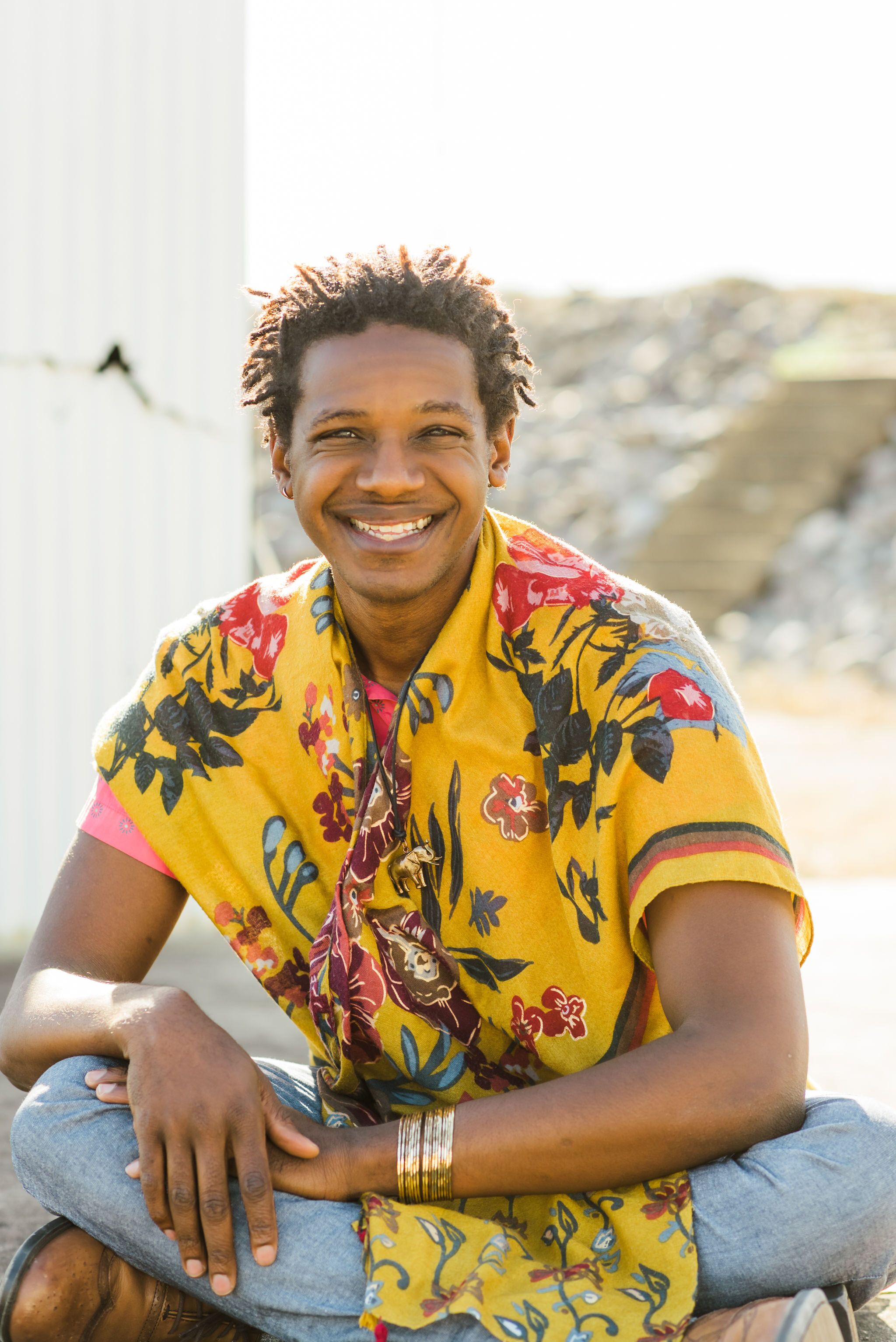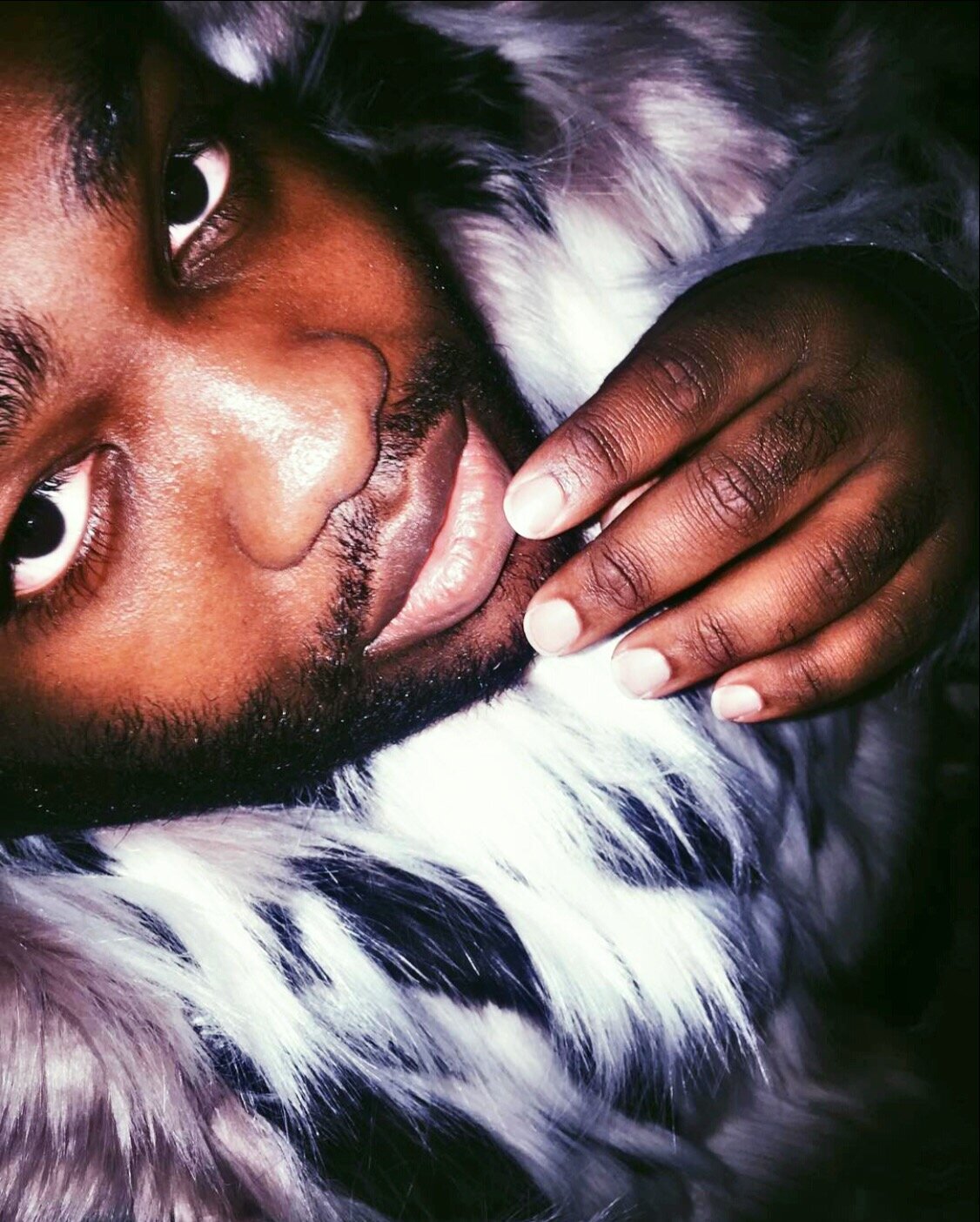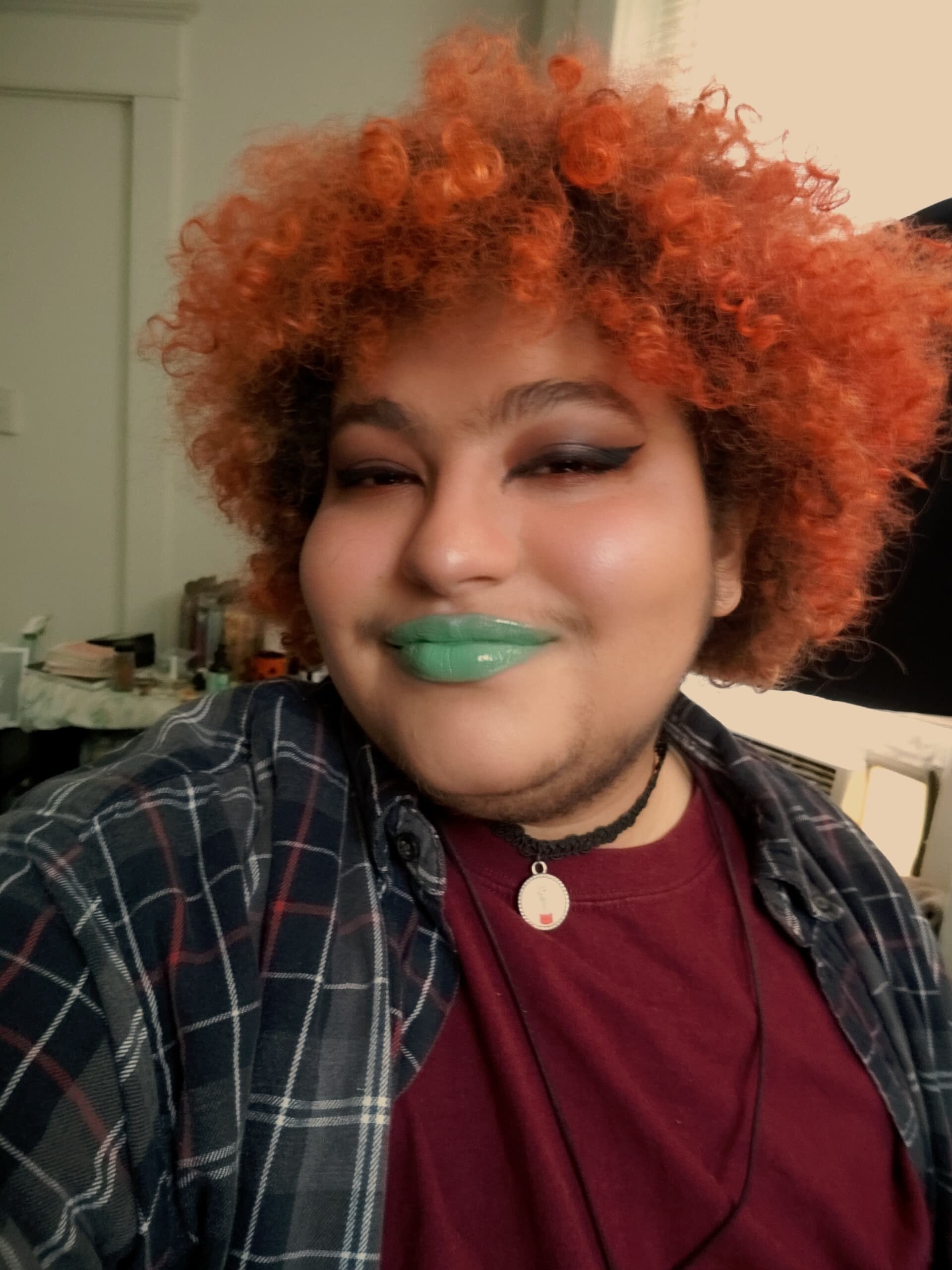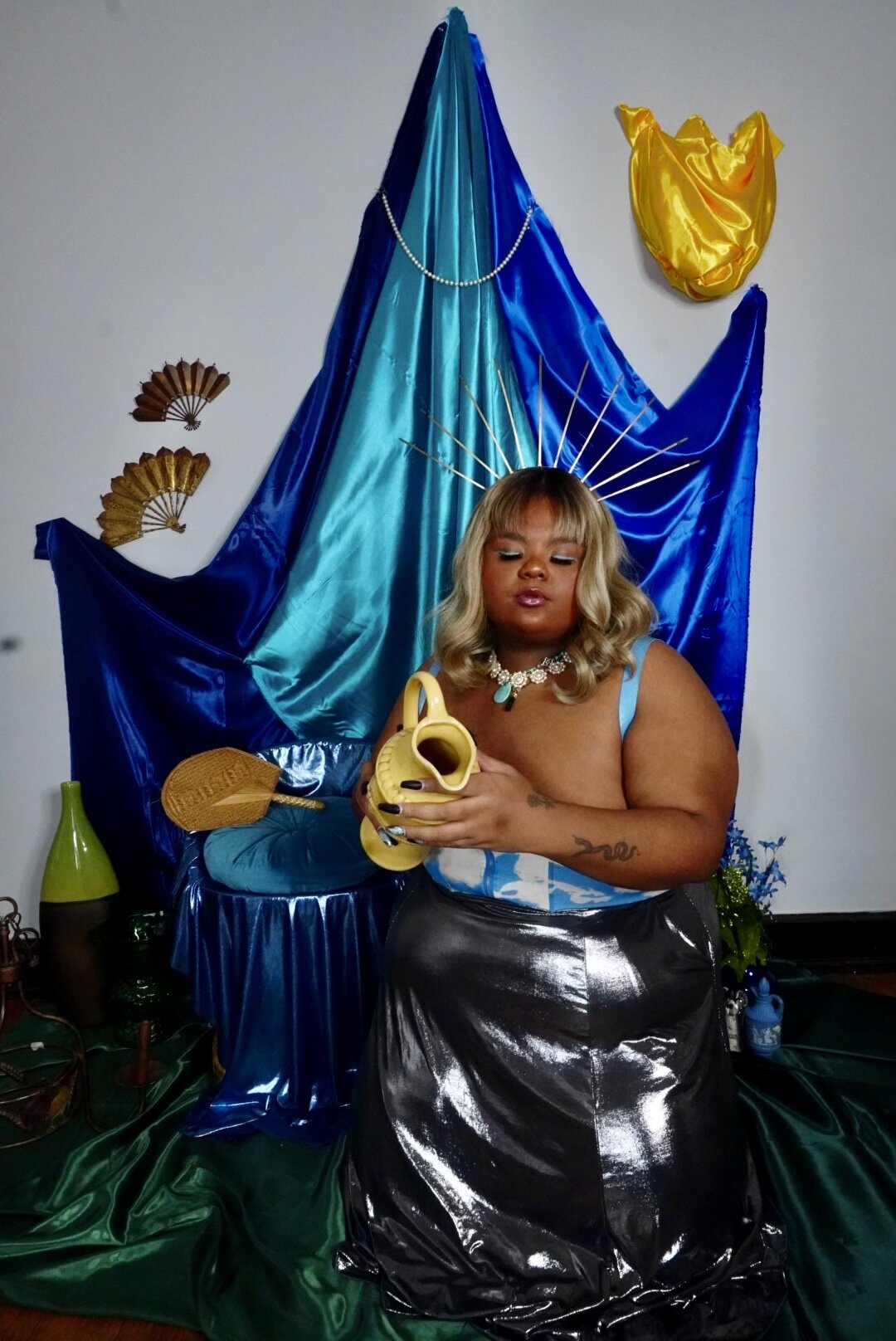Love is the Throughline: Archiving Black Genders
“Anything we love can be saved.”
—Alice Walker
The Black Genders Archive of Kentucky collects the interviews, photographs, and cherished artifacts of Black Kentuckians who are attempting to define themselves and reconnecting to pre-colonial concepts of gender. Black Kentuckians have something special to offer other Black thinkers, artists, and healers already examining how the social constructions of gender and race overlap. The Black Genders Archive seeks to be a space for healing, where stories, knowledge, and marginal identities are uplifted.
The archive would be impossible without the stories and offerings below. The myriad dreams and visualizations just within these four people have already breathed life into something that can nourish us for generations to come. The Black Genders Archive of Kentucky hopes to preserve histories, artifacts, experiences and conversations that explore how gender and Blackness intersect. In a state of perpetual urgency, slowing down to witness our beauty becomes a radical act of love.
We cannot express how much magic, creativity, and outright prophetic visions happened in these conversations — and how much had to be cut out of this piece. What is here is only a fraction of the iridescence.
For interview excerpts, follow @blackgendersarchiveofKY on Instagram.
Marquese, 30
Murray, Kentucky
Austen: What do you do for work?
Marquese: I'm in my first year as an assistant professor at Murray State University, and I'm currently the only Black person in my department, and definitely the only non-binary person or trans person in my department. I do a lot of work particularly in decolonizing the music history curriculum and the narratives that we tell about music history.
Gabe: Can you talk about what Kentucky has meant for you, what growing up in the South has meant, and how it shaped your experience?
Marquese: I had two sets of grandparents. One grandparent, a couple, is the main one I stayed with. They were from Missouri and Indiana. My other grandma’s side, the Adventist side, kept me churchy. She kept me spiritually grounded, so to speak — or spiritually wounded. We might unpack that some.
She kept me grounded in her Southern values. She grew up in Louisiana. There was a certain gentility, a certain way you're supposed to talk to people, and a certain type of manners that I grew up around. So growing up, I had these two lives I lived. I had my unsaved life with my grandparents, Connie and Nelson, and then my saved life with my maw-maw Mary, and all that that brought.
Gabe: I'm curious if learning about music has brought you closer to any realizations about gender or your experience in your body or in the world?
Marquese: Music, you know. Music and embodiment. That's how I kind of frame that. I think back to when I was a child, and how freely I moved, you know? Music would be playing and I would just dance and dance and dance. As you get older, you learn, “You don't move your hips in that way. You’re not … you're a boy. You don't move your hips that way.” I remember sitting in church and clapping my hands and moving in a certain way and my grandma grabbing me and saying, “Sit down. That's not how we move here,” you know? How we encode all of that information in our bodies and how, for years and years, I thought that my voice, the way that I sounded, the Blackness of my voice, was something to be fixed, something to be homogenized.
People used to say my voice was “noisy,” that it was ... “very colorful.” I always found it so interesting how “colorful” my voice is and how “noisy” it was. So it’s colorful and noisy, but you don’t know what to do with it? It's unique — that’s what you want to say, but you can't say that to a Black person. You can't say that to a Black person because it means that we're unique and that we don't need your gaze to define how good we are.
Austen: What are you fulfilling in this space?
Marquese: My particular passion is the work of a Black woman composer named Florence Price. That was my dissertation topic, but it's turned into this work of entering into, oftentimes, PWIs and white-dominated spaces and trying to speak truth to power.
When we talk about music, realize that Black folks have been making music. Realize that when you talk about American music, you're talking about Black history. You can’t divest the two, you can't separate the two. There's no such thing as American pop music without the spirituals, the blues, the jazz, gospel. Every prevalent genre that is topping the charts has its roots somewhere in the spirituals, and probably somewhere in direct theft or appropriation of pre-existing Black musical traditions. So I spent a lot of time trying to move my colleagues forward, and then when I can't move them forward, I just try to do my own thing and teach my classes in a way that I feel is divesting from that white patriarchal narrative that was shoved down my throat as an undergraduate student. I’m trying to offer something different to my students. I teach the voice and I teach music history, so I get to be in both worlds.
BACK TO TOP
Matthew, 28
Paducah, Kentucky
Austen: What town, city, or neighborhood did you grow up in Kentucky?
Matthew: I grew up in Paducah, Kentucky, which is big, but small. It's the city in this area because all the other places around are rural farmland, you know, that type of deal. It is very small in the grand scheme of things…. We didn't get a Starbucks ’till like 2014, if that tells you anything. Growing up here and being a person of color, being gay, being fat, I mean, there were struggles, of course. That's pretty much a recipe for a struggle in a town like this. As I got older and people became more open-minded, the struggle lessened and lessened and lessened.
Austen: What’s your life's work and how does gender play a role in your purpose?
Matthew: I've always wanted to be in the fashion industry. I went to school for business and I did a year of actual school for fashion buying. I would say that being a buyer would be my life's goal because fashion is such an integral part of me. I would love to be able to give that to someone else, by being a buyer or being a stylist, and helping someone dress themselves in confidence! I feel like that is what I'm very passionate about, emboldening people who normally would fade into the background. Not because they're not important, but because they just haven't reached that realization that they are someone, they are important, no matter what capacity someone else thinks that they are worth.
Gabe: Just out of curiosity, do you remember the first outfit that you put together that you felt really confident in or something that spoke to you?
Matthew: I thought it was so cute at the time, but it was a garbage outfit, OK! It was actually the first date that I ever went on.... I had just turned 16 and I had just gotten my permit. So I thought I was like, super cool. I spent four hours in the mall shopping for this date! I ended up choosing a black-and-white striped Henley, electric blue skinny jeans, fire-red high-tops from Journeys, and I found this huge anchor belt buckle. It was huge, and for some reason I thought, “Oh, that would be so cool as a necklace!” So I go get these necklace chains from Hobby Lobby and turn this big anchor into a necklace. We went to Stenmark Theater to see Get Him to The Greek. I don't think a lot of people can say that their first date was their best date. But even as awful and as goofy as I looked, my first date was the best date that I've ever had.
Austen: What parts of your gender identity, your gender expression, and your queerness did you learn specifically from Black women?
Matthew: Hunty, hunty! I’ve got to give props to my aunties. Because my mama gets cute when she wants to, but she's not a very girly girl. She's very much like sneakers, boots, oversized jacket, jeans, kind of stuff like that. She will dress up, she can wear heels, don't get me wrong. But my Aunt Joyce? Honey, let me tell you! She was the moment, every Saturday night.
She used to get ready to go out like the hour before my mama would get home. She would wait until my mama picked me up, and then she would go to the club. I would sit in her room, and I would watch Comic View on BET, and I would watch her pluck her eyebrows. I’d watch her base, power, and foundation, touch up her nails, put her little bamboo earrings in, touch up her hair and all that. So her in particular, I would say I watched the most and studied the most when it came to embracing the femininity, because Black women just have a natural style. Like, we all know everything that we see on the runway, Black women have been wearing it for decades.
I want to talk about street style, what's hot, and who's making things hot. Let me tell you what street style comes from. Street style comes from the streets. It comes from the bitches like me who didn't grow up with a silver spoon in their mouth, who's not on nobody's runway or used what they had, put together what they had to make outfits and make it fly. It comes from the Black girls in the hood, it comes from the Latinx girls in the favelas, it comes from the Chinese girls who live 500 miles away from the inner city coming to the city once a year, super-duper fly. Street style comes from the streets.
Gabe: I loved your picture so much, I was so excited to talk to you. So the last question is, why did you choose that picture to represent yourself?
Matthew: I just felt confident and carefree and fun in the picture. That's what I want people to see. That's what Black queer people need to see, is other Black queer people enjoying themselves, having fun, looking good, being confident, being brave, being bold, being whatever it is they want to be in whatever capacity they want to be and embracing it.
BACK TO TOP
James, 24
Shelbyville, Kentucky
Austen: Talk about the town you grew up in. What was the town like, the people, your experience there?
James: Originally, I was born in the Dominican Republic when I was 1-2 years old. My dad took me to live with him in Baltimore while my mom was getting her papers delivered to Queens for a year, and then Long Island for a year. I finished first grade and eventually settled in Shelbyville, Kentucky, around summer 2002. I grew up there in a suburb, but close enough that I woke up to the cows mooing. Shelbyville is one of those towns where it's like some parts it feels more like a mid-sized town, and then you go to different parts of the county and you're in the sticks.
Gabe: What did finding community look like early on in your time in Shelbyville?
James: My first friend that I ever made — and we're still friends — we called ourselves “The Scaredy Cats,” because we were both always little anxious kids. And I remember we had gone on a field trip to a cave or something, and we were both scared of the dark. That's how we got our name.
I did end up going online in the 7th grade, where I first started going on chatrooms. Not only was that there, that wall of anonymity, but there were also people who were all looking for connections. A lot of people were feeling similar things. That sense of found family felt a bit safer, and I could express myself more. While I did have the friends that loved me and that I love very much, it just felt like I didn't have to play up to an image.
Gabe: What kind of community work are you currently doing? How have you decided to be in the community actively?
James: Black Trans Louisville started because there's a collective experience of invisibility and exploitative tokenization. It’s unsafe, and Black trans people are not allowed to be their full selves and experience peace. From what we’ve gathered so far from our community needs survey, is housing assistance and finding resources — because there's a lot out there, but it’s not centralized. So having a space to be with other Black trans people.
I want to try to make it easier and I want us to be able to exist. I want us to have all the things that we aren't getting, like housing, employment, safety, and transition-related things. To be able to find people that can understand, encourage, and empower you to be your best self, and also give you the tangible resources — like money, clothes, shelter, food — to be able to experience that. Because these other organizations say they're all for us — they post all the hashtags and have all the meetings. But then, when it comes to actually doing things for us, they don't show up.
Austen: How does gender play a role in whether or not people give mutual aid?
James: So, I am poor, I am disabled, I am also non-binary. With finding mutual aid, I see mostly Black trans women and Black trans-feminine non-binary people... Their GoFundMe’s are usually survival and trying to get transition-related care. Most of those people are women or women-aligned. Non-binary is not always marketable.
Austen: What do you mean by gender is not marketable?
James: What I mean by marketable gender, for cis people, is anything that fits in the usual boxes. With the LGBTQ+ community, what I've seen is people still trying to fit in those boxes. The more you pass, the more mutual aid you’re going to get.
Gabe: What are some of your possibility models for how to be in the world?
James: I feel like none of them are real people. Even when I was a kid, I was going to fantasy and non-human possibilities. So I honestly really can't think of anybody off the top of my head.
Austen: Name some non-humans.
James: I really felt always connected to mysticism. So dragons and fairies. Dragons don’t give a fuck and they’re big and cool. Fairies are huge because they can be used with describing being gay… Definitely Hellboy. There was this one book series, Maximum Ride. I love those books. Those were really big comfort books for me. The feeling of flying an escape, having your family of people like you, and fighting for yourself and your right to exist. I've seen so many people figure out their gender, figure themselves out, from being able to go out of the realms of what we can imagine.
Gabe: How do you show your body that you love it? What can other Black trans people do to show their bodies love?
James: How I show my body is taking baths. A lot of trans people, especially if they've experienced dysphoria, may shy away from masturbation and things. There are so many different ways to do so many different things that can make you feel very good! I recommend researching that. I also recommend taking pictures for yourself without showing anybody else. For me, just taking ownership through body modification and making sure I know that my body is mine, that it doesn't have to be for other people, and experimenting with different things that work for me. Color outside the lines, break out of the box and break rules. Break rules.
BACK TO TOP
Sirene, 22
Cave City, Kentucky
Austen: Let's start with some basics. Talk about the town you grew up in, or the neighborhood, and your relationship to Kentucky.
Sirene: I am from Cave City, Kentucky. Most people know it by the huge dinosaur on I-65. It's a relatively small place, I think it's up to 2,500 people now, but I think it was just like 1,200 when I was growing up. You can feel the history. You can feel the white supremacy and the wrongdoings. You can feel the Indigenous spirits, and how they have been harmed and abused by the settler-colonial state. At the same time, you can also feel the Blackness. You can feel the beauty of the Blackness. It is my mother. It is my family. It is my grandma. When I think of Cave City, Kentucky, I think of a place that has an unusually strong Black history. My family has been in the same town for almost a hundred years. The house that I grew up in was made by my great-grandfather, and it's almost a hundred years old. I live in the house that he built.
Gabe: I'd love to talk more about your art, what you do creatively, who you are, and what work you're doing now.
Sirene: I've been trying to figure that out myself. I guess I'm a collage artist. I've always really loved found objects. My ancestors speak to me through trinkets and objects all the time. Like, I'll just be out on the road and, wait, there’s the head of a baby doll! Hoodoo is really just using what you have. It's using what you’ve got, and what's close to you.
I was thinking about my mom. I have two mothers. I have one that's crossed over and one that is still living. I’ve been blessed to have a team of mothers, but I think about my mom Stephanie, who’s a gangsta. I mean, she’s a conjure woman. So when I think about my spiritual practice, I think about my mom and how she sees the innate ability and possibility in everything. Nothing is out of her reach. Whatever you give her, she can flip it. That very much inspires my art. If you ever look at the pieces I make, I use a lot of the same pictures. It's not that I’m stuck or limited, but I want to find new ways to use what I already have.
Gabe: So I’m thinking about your mom as a model of possibility and also thinking about how you came into that agency?
Sirene: The process of these collages come with me whether I want them to or not. The pieces of me, the pieces of my people, are with me whether I have brought them or not. I am innately like a puzzle. I am innately a part of a multitude. I think that's why I have such a strong reaction to grief. I had never thought about myself outside of the group of people that I live in, outside of my elders, outside of my hometown. So now I'm kind of being forced into this individualism that isn't native, isn't indigenous to me. And so I'm trying to decolonize my mind in terms of grief, to know that this rugged individualism that I'm trying to throw myself in is white supremacy. It’s through ancestral veneration that I am still allowed to be a part of the multitude, if that makes sense.
Austen: What is indigenous to you, and then how do you tie that into your rituals now? How are you connecting back to that?
Sirene: All of my family made up our local church choir. My aunt was the director of the church choir, both of my moms were soloists, and I was the assistant director of the church choir. Singing was just a part of our everyday life. We would sit on my porch in the summers, and we would practice our songs. We live on top of a hill, so you could hear our voices all the way down the hill. It was just some real beautiful shit. I sing a lot of songs in my rituals, a lot of gospel songs.
Austen: Can you talk to me a little bit about how your gender made you Blacker?
Sirene: When I was learning what gender was through reading all the great feminist literary texts, seeing the connections to gender and a power placeholder. Especially for Black people, how I see it was just some sort of marketing tool. It only told us what we could be sold as. So why would I want this? It just seems like price types when we think about our history within this country. Like I am more than a $7.99 sticker, like, I have to be. My people, we have to be. Gender just became really insufficient. So I had no choice but to lean into Blackness. That led me into my power of self-determination, which is inherently Black.
Gabe: When do you feel closest to elsewhere?
Sirene: This right here! Being in discussion and community with Black people. Being in community, especially with my Black, trans siblings, is when I feel like I'm so close to elsewhere, so close to being and doing something different. Also going home. Going home has always been a refuge from the world. We’re just Black country folks in the middle of fucking Kentucky, getting high as fuck, eating a lot of chicken and cornbread. Like, that's my elsewhere. Anywhere I am with Black people, I am elsewhere.
BACK TO TOP
Love, like other verbs, requires action to be maintained and upheld. The archival process is inherently a labor of love. The archive offers us a framework for loving each other by prioritizing how we handle with care the evidence of one another’s existence — as if to say, “I love you, so I will carry you with me. Your life should come wherever we are going next. Your story matters, so I will tell it and keep it near.” This archive is a love letter to Black Kentuckians.
AUSTEN SMITH
Austen (they/them) is a masculine-of-center, non-binary wordsmith, editor, community facilitator and radical imagination doula.
Their work explores healing spiritual impacts of oppression, postactivism, gender proliferation and play, Black queerness, and co-imagining liberation as a somatic experience in addition to an environmental reality.
Learn more about Austen’s work here.
GABE TOMLIN
Gabe Tomlin is a writer, futurist and plant parent based in Louisville, Kentucky. He uses poetry, film, essay and oral history to explore themes of futurity, fugitivity and Blackness. His work has been featured in the University of Kentucky Special Collections Library, Shayla Lawson and Ross Gay’s The Tenderness Project and Taunt.
